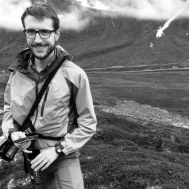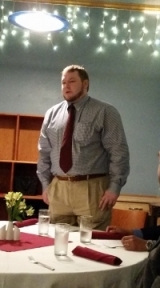2017 JET Interviews
On Friday, July 28, 2017, the Consular Office of Japan held its pre-departure luncheon for the 2017 JET Progran participants. This year, six Alaskans went to Japan. Four participants are Assistant Language Teachers (ALTs) who will teach English in schools throughout Japan, and two participants are Coordinators for International Relations (CIRs) who will work with local Japanese government to promote internationalization. We interviewed the JET participants about their interest in Japan, and what they hope to achieve during and after the JET program.
Justin Smith (ALT)

Q: Have you ever traveled to Japan? Have you ever studied the Japanese language?
I have not been to Japan, nor have I studied the language beyond the audio lessons I’ve been listening to this month. I have always been fascinated by the country’s traditions and cultures, and have studied Japanese culture and literature in some elective classes during my undergraduate studies.
Q: How did you learn about the JET program? What made you want to apply?
After deciding I wanted to go back to school to become a teacher, I decided I wanted to teach outside of Alaska. I told everyone I wanted to teach in New England because that was my second choice, and it felt like a pipe dream to even mention that what I really wanted to do was teach in Japan. When a family friend from Japan found out I was getting my Masters in Education, she encouraged me to apply for JET. As soon as I knew it was a realistic option for me as a non-Japanese speaker I applied immediately! As I said, I’ve always been fascinated by Japan and all the elements of its culture and traditions. I love adventures and traveling to new places and it is #1 on my list. I also knew simply visiting would not be enough time to fully enjoy Japan.
Q: In which prefecture in Japan will you be working? What challenges do you anticipate, and what do you look forward to the most?
I will be working in the Tokyo prefecture, in the city itself. I look forward to the challenge of being in a new place with no one I know and immersing myself in the world around me. I’m excited about the Tokyo night life and stores, the food everywhere, and the history and natural beauty around the country. I intend to explore every free second I get.
Q: What are your long-term plans and goals for after JET? How do you think participating in JET will help you achieve these goals?
I just finished my Masters in Secondary Education with a focus in English Language Arts. I plan to do JET for a few years and then come back to the states to work in a high school. I think this unique teaching experience will make me a better communicator and teacher. I think this incredible life experience will make me a far more capable mentor. I think the exposure I’ll get to a new culture will make me an adept liaison between both cultures during, and after I’m done with the program.
Q: Do you have any advice for anyone who may be interested in applying to the JET program?
To anyone interested in applying I would say: do it! It’s an amazing opportunity. One thing that was a major factor in me applying was realizing Japanese language proficiency was not required. Once I realized that my lack of language skills would not prohibit me from the program I immediately applied. I would also suggest taking time to research the program and the country. This helps determine if it’s a good fit and helps in deciding placement requests. Remember that this program is about bridging cultures, so application essays should reflect how you’ll serve as an emissary between the two countries.
Jillian Richie (ALT)

Yes, I have been to Japan 3 times in the past 5 years - once to visit a friend who was a JET in Tottori at the time, another to introduce my now husband to Japan and buy fancy knives on Kappabashidori, and the most recent to backcountry ski with friends in Hokkaido! I grew up in Anchorage's Japanese Immersion Program and studied the language and culture in school from K-12. I have loved spending time in Japan because I feel comfortable with some of the language and culture from my education, but still have the fun experience and surprise of being in a new place and learning new things.
How did you learn about JET? What made you want to apply?
I feel like I have never not known about JET. In the Immersion Program we were introduced to JET from a very young age, and I had lots of friends and role models who participated in the program and came back to share their stories! Because Japanese was such an important part of my young life, and has subsequently shaped my studies and profession as an anthropologist and archaeologist, as well as personal interest in travel and language, I felt a responsibility to help provide a similar cultural experience in Japan. So I applied for JET!
In which prefecture in Japan will you be working? What challenges do you anticipate, and what do you look forward to the most?
I will be working in Okushiri Island. I've been told that this is the first time they'll have a permanent JET on the small island of ~3000 residents! I requested a rural placement and couldn't be happier with where I'm heading. I'm looking forward to learning more about the community, helping to build their English education program, and exploring the natural beauty of the island that my Google searches have revealed :) One of my concerns is that I am prone to sea sickness and a strong fishing industry combined with frequent ferry travel may test my stomach!
What are your long-term plans and goals for after JET? How do you think participating in JET will help you achieve these goals?
I am currently an archaeologist specializing in northern Alaska's prehistory and culture. I have a long-standing interest in cross cultural studies and have experienced barriers to communication and education first hand in rural Alaskan villages where western education and traditional values do not always coincide. I plan to continue down the path of cultural studies and hope to incorporate my Alaskan and Japanese experiences towards promoting and researching heritage preservation and cross cultural education.
Sam Slone (CIR)

What first piqued your interest in Japan? When did you begin learning the Japanese language?
When I was younger, I encountered Japanese culture through popular media, mostly manga, anime, and games. I was captivated by the views of the world they presented and the ways they reflected an unfamiliar culture, and explored imported media more and more. Beginning in high school, I took a chance and began commuting to a second school to take Japanese courses, which were not offered at my home school. I continued to study through the rest of high school, then college, and graduated with a language degree.
How did you learn about the JET program? What made you want to apply?
JET has been on my mind almost as long as I’ve studied Japanese. My teachers usually had a poster or a stack of pamphlets somewhere in the room, so I was introduced to the idea early on. I saw JET as both an opportunity to extend my study of Japan and Japanese, particularly the culture and language of a professional environment, and to develop a greater portfolio of professional skills that will be of value to my career in the future.
What made you want to apply for the CIR position instead of ALT?
I was certainly also attracted to the idea of being involved with education and English instruction. However, due to my particular hopes to pursue a career in translation, I felt that the duties and demands of a CIR would present more opportunities to hone that particular skillset. Furthermore, the more stringent expectations regarding an applicant’s existing Japanese ability convinced me that I would have greater opportunity to apply my time already invested in studying Japanese and Japan, which appealed to me as well.
In which prefecture will you be working? What challenges do you anticipate? What do you look forward to the most?
While I have existing experience in professional environments and clerical duties, this will be my first time entering the Japanese working culture, and office culture in particular. I anticipate some challenges in adapting and applying my experiences to the demands of my new workplace. I am very much looking forward to learning more about the unique local culture of my assignment, and considering how to reach out and communicate America and Alaskan culture as well.
What are your long-term plans and goals for after JET? How do you think participating in JET will help you achieve these goals?
I hope to pursue a career in translation and/or localization writing after JET. I enjoy the creative challenge of translating in a way that best conveys the original meaning and voice, while bringing it to a new audience in an engaging and understandable form. To that end, I am looking forward to the opportunity to practice my language skills and broaden my experiences in Japanese culture, which I feel will be applicable to my future career.
Do you have any advice for anyone who may be interested in applying to the JET program?
If you’re interested in broadening your horizons, and learning about the world, traveling is an excellent way to do it. If you’re not certain where your career might take you, it can also be a way to discover new passions. If you’re curious at all about what JET can offer you, I suggest you take the plunge. Remember you don’t have to know Japanese, or be a Japan expert to apply. There are lots of other skills and experiences that you can find ways to apply to the JET experience, so take the time to think about what you can do and how it might be useful to an ALT or CIR when you are filing your application.
